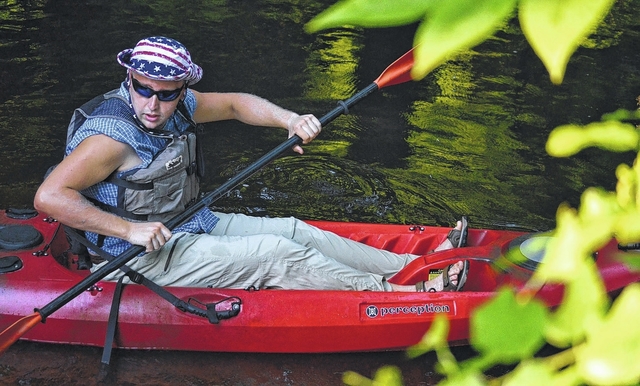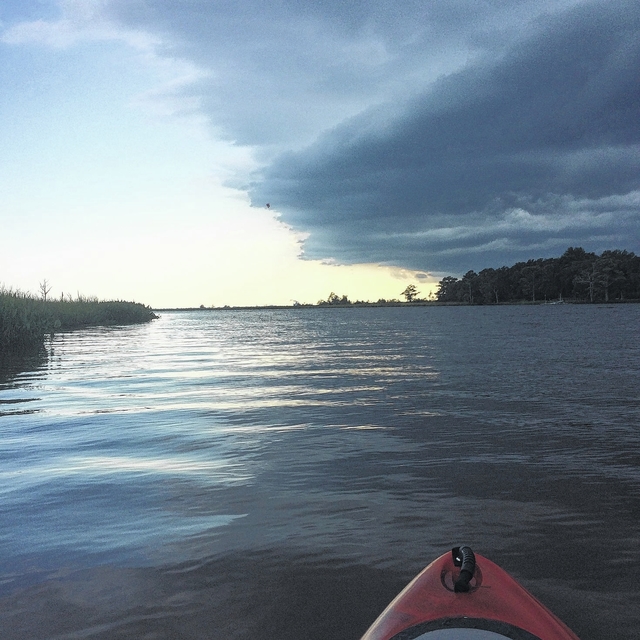ROCKINGHAM — Last week, we chronicled the beginning of Anthony Bristow’s journey downriver from the Hitchcock Creek access point at Roberdel to Georgetown, South Carolina. This week, he’s home safe and sound with stories to share.
Bristow said that on day one of his five-day odyssey, he was anxious to move out of his comfort zone.
“That first day was actually kind of boring, because I had done that route so many times practicing for the big one,” he said Friday. “I found myself in a rush to go past that, so I could cover new ground and see new things. I did see an alligator in Cheraw that was probably the biggest one of the whole trip. It was as long as my 10-foot kayak. I was on the phone with my grandmother telling her I was almost in Cheraw, and I saw him come out into the creek and I said, ‘I’ve gotta go.’”
Bristow explained that the gator went under after noticing him.
“I kind of paddled over to where he was so I could use my phone’s camera to get proof,” he said. “Some people don’t believe you’d find an alligator that size as close to here as Cheraw. Over the whole way, I counted 24 in all. Once you pass the 701 in Conway, from there I saw about 20 of them. They were everywhere.”
Asked what he would have done if his kayak had tipped during the close encounter, Bristow said, “I guess I would have swam fast. But every time I got close, he would go further away.”
On the fourth day, a small gator swatted the side of his kayak after he finished talking with his mother on the phone.
“It scared me,” Bristow admitted. “Before, I would put my hands in the water to cool off, but after that, everything stayed in the boat.
Soon, Bristow was well beyond familiar territory and the paddling became more challenging — as did the weather. He said there were storms each day, sometimes during the night. And there were two kinds of days: “Storm in the distance, or storm right on top of you. There was never a leisurely night.”
“I thought I’d made it once I got past Society Hill, that’s when the adventure was really beginning,” he said. “It was a smooth ride. I saw bald eagles and deer. I even saw turkeys. But when the storms kicked up, they were brutal. My mom called me one night and asked ‘Are you still on the water?’ And I said, ‘Yes ma’am.’ And she told me I needed to get off the water, but every time I tried to, there were trees falling on the land.”
On one particularly stormy night, Bristow said rain, thunder and lightning caught him while he was sleeping.
“It came on in the night while I was in my hammock, and I noticed my tree limbs were starting to bend,” he said. “It had filled up with water. I noticed the ground was getting a lot closer than it was when I first got in.”
The fifth night brought the worst weather of the voyage, he explained.
“I’d made it out of the fresh water and into the brackish and marsh area,” Bristow said. “It was in the same area where I saw 20 of the 24 alligators, and this huge storm came up. A guy who I passed, who was on a boat, told me not to worry, and that (the storm) was more than an hour away. He was even letting his kids swim around. But I’d barely made it around the next bend when the storm hit.
“I pulled onto one of those little muddy islands in the marsh, the ones that are small and have that grass growing on them. And I got on top of my kayak and covered up with my tarp and just waited.”
Bristow has a Facebook friend, Scottie Wilkes, who “was my angel that night. He found me on Facebook and asked how I was doing in the storm. He asked my location and he found a dock and told me it was only about 400 yards from me. I couldn’t see it from where I was, but he could see it and was able to give me a way to find it. I made it to that dock and pulled my kayak on and got in.”
Bristow remained in the kayak until about 1:30 a.m., riding out the bad weather as best he could until he finally caught a break.
“The storm passed,” he recalled. “I could see these red lights from Georgetown, and I thought it was about 500 yards so I decided to start paddling. But those lights I was seeing, they weren’t as close as I thought. It turned out to be 6 miles.”
Finally he reached the Georgetown Marina — a private marina where he hoped to find someone to ask if he could stop there.
“There was nobody around that time of night, but I got on their dock and slept on their picnic table that night,” he said. “Next morning I was woken up by the guys about to go out on their charters to go fishing.”
One of the men told Bristow that if he planned to make it to the lighthouse, “today is the day.”
“Because the tide was going out,” Bristow said. “He said if I caught it just right, I could get out there, and that if I just hung around for a little while, the tide would come back in and I could use that to get back. It’s a dangerous area and I had a lot of people tell me to just stop at the marina, but I went. It wasn’t until after the fact that I learned the little island the lighthouse is on is owned by Homeland Security and no one is supposed to go onto the island.”
Bristow had planned to meet up with his mother and grandmother at the end of the trip. They’d been out in a boat touring the area and had even waved at him on his way to the lighthouse.
“But their tour guide ran over, so when I got out at the boat landing, nobody was there,” he said, laughing. “From there I waited, about 45 minutes. When you’re paddling you’re envisioning this big homecoming.”
While he waited, he realized he was famished.
“I saw I had two MREs left, and that’s when it hit me — that during the storms in the last couple of days, I hadn’t been eating,” he said. “I started eating immediately.”
Bristow said when the family was at last reunited, his grandmother asked what he wanted to do.
“I said, ‘Krispy Kreme. Shower. Bed.’ in that order,” he recalled. “When we went into Krispy Kreme I was the nastiest person in there for sure, but I had to get a dozen. Then I got the shower at my grandmother’s hotel, where I slept. I didn’t leave out until the next morning.”
Once Bristow was home after a week on the water, he said he was surprised at how much had changed in such a short amount of time.
“Most surprising thing when I got back — I get back and everyone is chasing Pokémon,” he said. “Pokémon became real. It’s amazing how fast times change. When you leave for a week and come home. It was just different. I had messages from people telling me I should have been Pokémon hunting when I was on the river. With respect to the game, I had real alligators. I had real stuff going on. On my list of things to pack, Pokéballs were not on there. But apparently there are some types of Pokémon you can find near water and some people thought I should have tried harder.”
The journey left several impressions on Bristow, who said that while he wouldn’t trade his experience for anything, he would also not do it again by himself.
“I learned that just because you’re 6-foot-tall does not mean that an 8-foot tarp is enough,” he said. “That’s the biggest one. You can never have enough tarp, and if you can bring three, go ahead and do it. Also, in terms of weather, don’t trust the stars. Things just come up so fast there.”
He also learned to rely on himself, he said, explaining that before he made it to the dock in the marsh, a boat passed him by while he was waving his arms in an effort to flag them down. They’d simply waved back.
“On night three, I got a new outlook on things,” he said. “That line from ‘Forest Gump’ when he talks about the rain. I got an appreciation for all veterans. And I’ll never be out in a storm alone again with out thinking of homeless people. To imagine there are people who live that every night, have nowhere to go, is just unreal.”
Bristow said from the moment he put in, giving up was never an option.
“Some people tried saying I should stop because it was getting rough and only going to get rougher,” he said. “People don’t seem to realize that I can’t quit once I start something. I do not quit.
“As I was getting to that boat landing, I thought to myself, ‘This river’s only got 50 yards left to kill me,’” he continued. “Then, a little fin came up. I just sat my paddle down and stopped rowing. I was already against the current there at that turn, dead in the water. I could not have done anything if I’d wanted to, but there was a boat crossing near by, and finally I saw that it was a dolphin. It jumped out of the water and went over the boat.”
Reach reporter Melonie McLaurin at 910-817-2673 and follow her on Twitter @meloniemclaurin.


